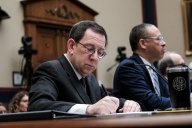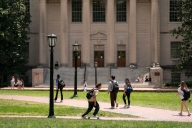You have /5 articles left.
Sign up for a free account or log in.
The Indiana University Board of Trustees tabled its scheduled Friday vote on controversial changes to the Kinsey Institute. IU administrators had proposed spinning off part of the historic sex research institute as a nonprofit, creating concerns about the future of the institute and its extensive collection of sex-, gender- and erotica-related materials.
The spinoff proposal came after the Republican-dominated Indiana General Assembly passed a state budget this spring banning the institute from receiving state funds.
University administrators didn’t clarify which aspects of the institute they planned to spin off, saying some details were still undetermined. They said they planned for the nonprofit to “separately fund and manage” certain “limited functions”—a path that could fully separate the institute from state funding. Multiple Kinsey employees and affiliates had asked university leaders to hold off on the vote to provide more time for vetting. Leaders agreed to that Friday.
“Under the legislation, the university’s general fund can no longer support Kinsey Institute operations,” W. Quinn Buckner, the board chair, said in a written statement Friday. He said IU now “requires a mechanism to fund and operate” what the general fund had supported.
“The proposal we considered today would keep the Kinsey Institute intact and very much present at Indiana University,” he said. “Only a small portion of administrative and operational functions would be conducted through the proposed nonprofit entity. The Kinsey Institute, its name, its faculty, and its collections would continue to exist at Indiana University as a pillar of intellectual freedom and academic inquiry … We look forward to considering this topic again at a future meeting.”
William Yarber, Provost Professor in Public Health at IU Bloomington and a senior scientist at Kinsey, said the delay provides optimism to the institute’s supporters.
Yarber said the university’s then president defended the institute’s work back when it was founded, in 1947. “That was pretty extraordinary 75 years ago,” he said, “and from that it’s been maintained that that’s a core component: the right for the faculty to ask questions in their discipline. It’s a prime example of what the academy is about, and that’s academic freedom.”








